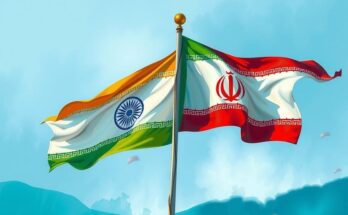Tensions in South Sudan have escalated following militia violence in Upper Nile state, political disagreements between President Salva Kiir and First Vice President Riek Machar, and recent cabinet reshuffles. The United Nations and various embassies condemned an attack on a UN helicopter amid concerns about the deteriorating security situation. The potential for renewed civil conflict looms, with international efforts to promote dialogue and peace being critical in alleviating the crisis.
Tensions are escalating in South Sudan, primarily in Upper Nile state, due to increased militia violence, political cabinet reshuffles, and the arrest of senior officials. At the core of this turmoil are President Salva Kiir and First Vice President Riek Machar, whose recent political disagreements have led to deadly confrontations. This instability follows a fragile peace accord from 2018 that previously ended a devastating civil war, resulting in nearly 400,000 fatalities.
The latest discord emerged in February when President Kiir dismissed several key government officials as part of a cabinet reshuffle. According to Daniel Akech from the International Crisis Group, these changes were perceived by Machar as violations of the peace agreement. Riots erupted in western Bahr al-Ghazal in response to Kiir’s unilateral decisions, which were made without Machar’s input. Furthermore, the redeployment of armed forces led to violence in regions like Nasir, culminating in an attack on a United Nations helicopter.
International responses have been swift, with the embassies of several Western nations condemning the attack on the UN helicopter. Subsequently, the United States ordered the departure of non-essential personnel from South Sudan due to ongoing armed conflict and ethnic strife. The U.S. travel advisory highlights the availability of weapons among the population and the resultant threat of violence.
In response to the mounting tensions, the Intergovernmental Authority on Development (IGAD) convened a summit, while Uganda deployed special forces to South Sudan to support the Kiir government. Uganda’s army chief asserted their recognition of Kiir as President, suggesting that any challenge to his authority would be considered a declaration of war against Uganda. Troops from Kiir and Machar’s factions are strategically positioned near Juba, enhancing the potential for conflict.
The United Nations Commission on Human Rights has issued warnings about South Sudan’s regression, criticizing the lack of progress in democratic institution building and expressing concern over significant human rights crises, including widespread food insecurity and population displacement. Calls from civil society for political dialogue have intensified, as tensions rooted in past conflicts between Kiir and Machar threaten to unravel hard-won peace.
Experts express skepticism about the relationship between Kiir and Machar improving, emphasizing deep-seated suspicions and unresolved tensions dating back to the civil war. The absence of a cohesive constitution and the failure to unify the armed forces further complicate the situation, underlining the precarious balance of power in the nation.
The potential for renewed civil war looms as both leaders command separate armed factions across South Sudan, aggravating the security crisis. Analysts have cautioned that the volatile environment could lead groups like the White Army to seize strategic territories, potentially exacerbating instability in neighboring Sudan. International assessments reflect a deteriorating security landscape that could echo the ongoing turbulence of the Sudan crisis.
While the situation remains precarious, there are divergent perspectives on the potential for full-scale violence in South Sudan. Political scientist Abiol Lual Deng notes the historical context of low-level violence, stressing that the international community plays a crucial role in applying pressure to halt hostilities. Overall, Deng advocates for concerted international efforts to influence Kiir and Machar towards peace, emphasizing the younger generation’s disconnection from traditional ethnic divisions.
In summary, the situation in South Sudan is dire, marked by escalating tensions driven by political disagreements between President Kiir and First Vice President Machar. Violence has surged, prompting international condemnation and intervention. The absence of a collaborative political framework and the lingering memories of civil war exacerbate the challenges facing the nation. Urgent action from both national leaders and the international community is essential to mitigate the threat of renewed violence and to foster a more stable future.
Original Source: www.dw.com




